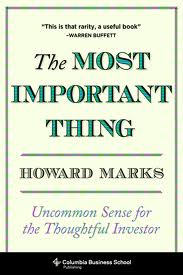Michael Mauboussin, author & former Chief Investment Strategist at Legg Mason, recently joined Consuelo Mack for an interview on WealthTrack (one of my favorite resources for interesting conversations with interesting people; the transcripts are economically priced at $4.99 per episode). Their conversation touched upon a number of relevant portfolio management topics. For those of you with more time, I highly recommend listening/watching/reading the episode in its entirety.
Luck, Process Over Outcome, Portfolio Management, Psychology
“MAUBOUSSIN: …luck is very important, especially for short-term results...everyone’s gotten better, and as everyone’s gotten better, skills become more uniform. There’s less variance or difference between the best and the worst. So even if luck plays the same role, lesser variance in skill means batting averages come down…So I call it the paradox of skill, because it says more skill actually leads to more luck in results…
MACK: So what are the kind of skills that we look at that would differentiate an investor from the pack, from the rest of the Street?
MAUBOUSSIN: …when you get to worlds that are probabilistic like money management where what you do, you don’t really know what the outcome is going to be, then it becomes a process and, to me, successful investing has three components to the process. The first would be analytical, and analytical to me means finding stocks for less than what they’re worth, or in the jargon means getting an investment edge, and second and related to that is putting them into the portfolio at the proper weight. So it’s not just finding good investment ideas, but it’s how you build a portfolio with those investment ideas. And by the way, a lot of people in the financial community focus on buying attractive stocks, but the structure is actually really important as well…the portfolio positioning, I think there’s room for improvement there.”
When dealing with probabilistic predictions, such as in investing, one must focus on process, not outcome. (For more on this, be sure to check out Howard Marks’ discussion on “many futures are possible, but only one future occurs.”)
As our Readers know, PMJar seeks to emphasize the importance of portfolio management within the investment process. We are glad to see validation of this view from a premier investor such as Michael Mauboussin – that successful investing requires “not just finding good investment ideas, but how you build a portfolio with those investment ideas.”
One other corollary from the quote above – investing is a zero sum game. In order to make profits, you need to be better than the “average” market participant. But over time, ripe investment profits have lured the brightest talent from all corners of world professions and consequently, the “average” intelligence of investors has increased. This means that the qualifications necessary to reach “average” status has inconveniently increased as well.
Here’s an exercise in self-awareness: where do you fit in – below, at, or above average – versus other fellow investors?
Luck, Process Over Outcome, Sizing, Psychology
“MAUBOUSSIN: This is such an interesting question, because if you look into the future and say to people, “Hey, future outcomes are a combination of skill and luck,” everybody gets that. Right? Everybody sort of understands that’s the case, but when looking at past results, we have a much more difficult time, and I think the answer to this comes from actually neuroscience. Brain scientists have determined that there’s part of your left hemisphere in your brain which they call the interpreter, and the interpreter’s job is when it sees an effect, it makes up a cause and, by the way, the interpreter doesn’t know about skill and luck, so if it sees an effect that’s good, let’s say good results, it says, “Hey, that must be because of skill,” and then your mind puts the whole issue to rest. It just sets it aside. So we have a natural sort of module in our brain that associates good results with skill. We know it’s not always the case for the future, but once it’s done, our minds want to think about it that way.
MACK: Therefore, do we repeat, when we’ve had a success that we attribute to our skill, do we constantly repeat those same moves in order to get the same result?
MAUBOUSSIN: I think it kind of gets to one of the biggest mistakes you see in the world of investing…this is a pattern we’ve seen not only with individuals but also institutions: buying what’s hot and inversely often getting rid of what’s cold, and that ultimately is very poor for investor results. It’s about a percentage point per year reduction in long-term results for individual investors because of this effect of buying high and selling low.
…one would be over confidence. We tend to be very over confident in our own capabilities. You can show this with simple little tests, and the way that tends to show up in investing is people, when they’re projecting out into the future, they’re much more confident about the range of outcomes, so they make a very narrow range of outcomes rather than a much broader range of outcomes. So there would be one example, over confidence, and its manifestation...
...try to weave into your process tools and techniques to manage and mitigate them. I don’t think you can ever fully eradicate them, but just be aware of them and learning about them. So for example, in the over confidence, you can start to use tools to better calibrate the future, for example, using past data or making sure you’re pushing out your ranges appropriately. So there are, in every case, some tools to help you manage that."
An interesting observation on our brain’s inability to distinguish between luck vs. skill in a historical context, which explains our natural tendency to chase performance return trends.
In addition to projecting a narrow range of outcomes, overconfidence is deadly in another way – overconfidence in sizing. For example, after hitting a couple winners (mostly due to luck), an investor says “Hey, I’m really good at this. I really should have made those previous investments bigger bets. Next time.” And so, the overconfident investor sizes up the next few investments. But luck fails to appear, and the damage hurts far more because these bets were sized greater.
But worry not, salvation does exist. If investors are able to identify and become aware of their behavioral biases, they can work to control and counter the associated negative effect.
Macro
CONSUELO MACK: What’s interesting is we’ve just come through a period where we’ve heard over and over again that macro matters...I’ve had a lot of value investors come on who have very good long-term track records, saying, ‘You know what? I didn’t used to pay attention to the macro. Now I really have to pay attention. It really matters.’
MICHAEL MAUBOUSSIN: The first thing I would say about this, is this is an area of prediction that’s been very well studied, and my favorite scientist on this is a psychologist named Phil Tetlock at University of Pennsylvania who did an exhaustive study of predictions in social, political, and economic outcomes, and what he found, I think, beyond a shadow of a doubt is that experts are very poor at predicting the future. So while I know people are worries about getting whipsawed by macro events, the evidence that anybody can anticipate exactly what’s going to happen next is very, very weak. So that’s the first thing, is just to be very reserved about your belief in your ability to anticipate what’s going to happen next…Obviously, you want to be mindful of macro. I don’t want to say you be dismissive of it. I would say macro aware, but in some ways macro agnostic.”
Risk Free Rate, Equity Risk Premium
“The most interesting anomaly that I see continues to be what is high equity risk premium. So in plain words, you think of a risk-free rate of return. In the United States, a 10-year Treasury note is a good proxy for that…about a 1.8% yield. An equity risk premium is the return above and beyond that you would expect for taking on additional risk on equities. Now, over the long haul, that equity risk premium has been about three or four percent, something like that, and today, by most reckoning, it’s a lot closer to six percent. It’s very, very high.”
Historically (depending on time period examined), equity risk premium is normally 3-4%, versus ~6% today. But does this mean that today’s equity risk premium is abnormally high? Or was the historical equity risk premium just abnormally low?
What is the qualitative explanation behind the figure for the “normal” equity risk premium? Must it hold true into perpetuity?













